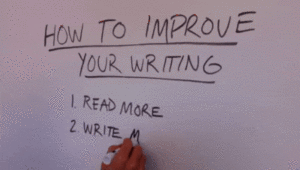
This post was written by an external contributor. Sarah Wilson reveals how you can build up your skills and turn down time into do time.
Look, there’s no denying it. There’s nothing more satisfying than coming home after a long day, jumping into your comfy clothes and zoning out in front of your latest Netflix binge.
But almost every one of us has at some point reached our eighth episode and quietly thought “I should probably do something a bit more productive with my free time”, before allowing the next one to queue.

Of course, days/evenings/weekends like this are important. I’m obviously not asking you to give up Netflix (god forbid) any time soon. But with the vast expanse of the internet at your fingers, it’s worth checking out what it can offer you beyond TV shows every once in a while.
There’s a whole world of skills available to you on the internet. The kinds that won’t only help your personal development but your career development too. Many of these you can learn totally for free, (or for a very small fee) and the extra bonus is you don’t even have to get out of your PJ’s for it.
Coding

Unfortunately, I happened to fall into a generation in which IT lessons were more focused on PowerPoint presentations about my favourite films than coding (or in fact, anything much useful at all).
In schools nowadays, kids are learning to code early, and it’ll set them up incredibly well for the workplace. Although I know how to make WordArt swirl around the screen in a loop, so there.
Don’t fret. These child geniuses aren’t coming for your job just yet. In the meantime, there are a tonne of free resources you can go to for coding advice and tutorials in order to catch up. Codeacademy is a great place to start, offering free coding classes in 12 different languages.
If that’s not your style, try out some YouTube tutorials. Codingbasics is particularly helpful for beginners.
Language learning

There are so many resources for learning languages online that it’s almost hard to know where to start. Duolingo is a great place to go for getting a handle on the basics. However, it’s important to remember when learning a language that you need to tackle all areas.
Whilst Duolingo is great for vocabulary, it’s not so strong on grammar teaching. So be sure to supplement it with something else.
Fluent U is a great website for giving you authentic, real-world uses of language – perfect for holidays – whilst Verbling is a site for setting learners up with native speakers.
If there’s some element of the language you’re unsure about, there’s almost certainly a dedicated blog out there to help you with those tricky conjugations, tenses and genders.
Online lectures

If you’re a recent graduate yearning for your university days or even a current student wanting a little bit extra, (kudos to you) then there’s a plethora of sites that offer free access to lectures and course materials from around the world.
Try coursera or open learn with The Open University for material ranging from Literature to Science and Mathematics. Or, if you’ve ever wondered what it would be like to attend Yale, stop imagining and dive in with their free materials available here.
Lots of universities have similar online courses, so see where else you can be a student at!
Writing

Whether for papers, copywriting sites, or freelance projects on sites such as Upwork, writing is a fantastic way to build your portfolio. It also makes your CV shine, as we highlighted previously.
If you’re looking to write more journalistic stuff, google around to find pitch guidelines and the best way to contact whichever publication you’re shooting for.
If you’re selling your work, make sure you’re getting a fair price for what you’ve written, and set yourself realistic deadlines. Once you start building up a portfolio, you’ll find more opportunities to write content you actually enjoy.
And who knows, maybe in a few year’s time you’ll be writing those Netflix shows rather than just watching them….
Download Debut and connect with us on Facebook, Twitter and LinkedIn for more careers insights.


